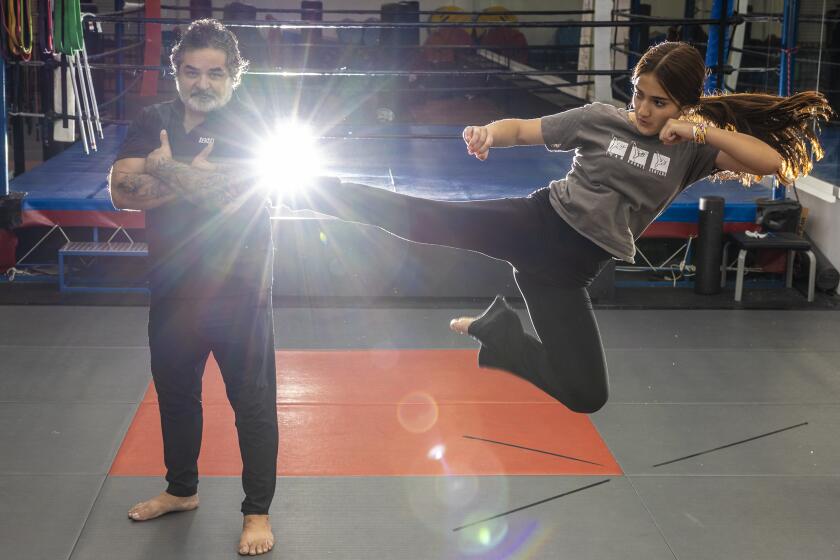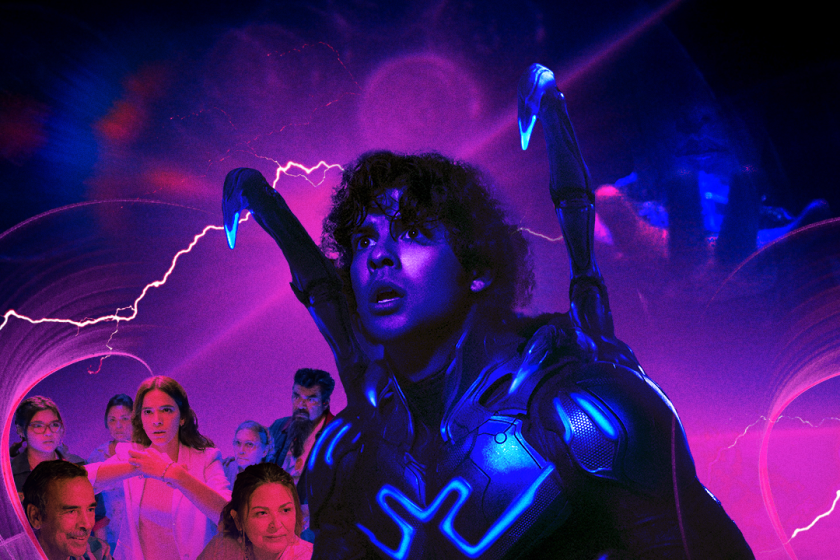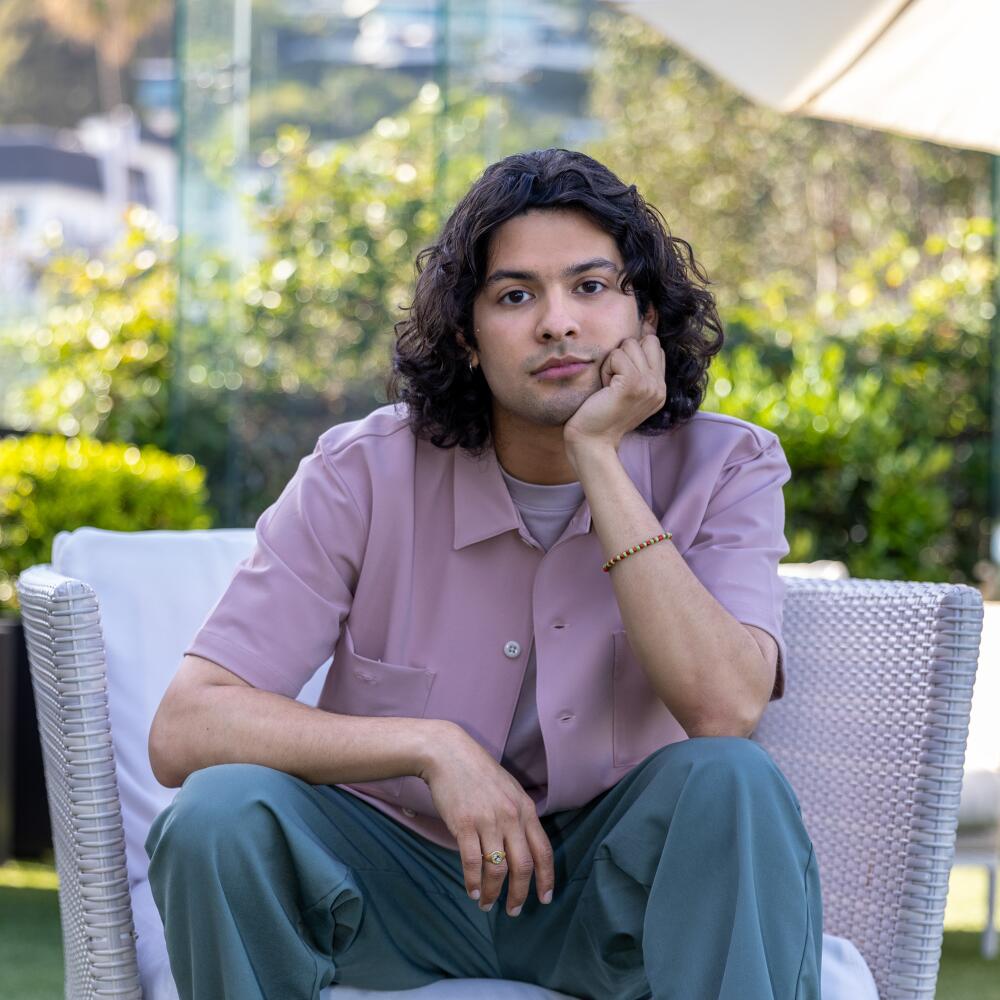
- Share via
Xolo Maridueña received two phone calls the day he found out he’d been cast in “Cobra Kai,” the spinoff series set three decades after the 1984 “The Karate Kid” movie ended.
The first came from show creators Josh Heald, Jon Hurwitz and Hayden Schlossberg, who confirmed that he had landed the protagonist role of Miguel Diaz, the scrappy Reseda teen that learns martial arts after being bullied.
Maridueña, then 16, couldn’t believe his luck.
“Oh my God, what is going on?” the now 23-year-old said via Zoom, recounting the events of that afternoon like a play-by-play commentator.
Dojos in Southern California were hit hard by the pandemic and decline of Hollywood interest in karate, but “Cobra Kai” has provided a boost.
Then, his phone rang again. This time, it was Ralph Macchio, the karate kid himself.
“Is this Zolo?” asked Macchio.
Though Maridueña laughs now at the wrong pronunciation of his name (it’s “sho-low”), the young actor was too preoccupied at the time to correct his new co-star. With his phone’s battery at 1%, he worried that the call would drop, giving Macchio the impression that he was a bratty kid who’d hung up on him. If that were to happen, Maridueña thought, surely they’d boot him off the show before shooting even began.
That worst-case scenario never came to pass, and as Macchio can attest, Maridueña “is the antithesis of a bratty kid.” In truth, he was tailor-made for a role that saw him grow from a brace-faced teen into a full-fledged adult. Now, seven years after that fateful day, the actor is getting ready to say goodbye to Miguel Diaz — the first part of the sixth and final season of “Cobra Kai” was released on Netflix on Thursday, with Part 2 coming out Nov. 15, and Part 3 coming out sometime in 2025.
“There was just something about him that we just fell in love with right off the bat,” said William Zabka, who plays Johnny Lawrence, the antagonist in the first “The Karate Kid” movie who gets a shot at redemption in the Netflix series. “We knew right away that that was our Miguel.”
“He was lanky and had that LaRusso kind of long-limbed awkwardness,” Macchio said, alluding to the fact that Miguel Diaz is a modern take on his own character. “He was perfect from the start.”
In taking the major role, Maridueña shouldered the responsibility of being one of the few Latino characters in the show — Miguel was intentionally written to better reflect the demographics of the San Fernando Valley. He says writers consulted with him to further develop his storyline with an Ecuadorian ethnicity in mind — Maridueña himself is of Mexican, Cuban and Ecuadorian heritage.
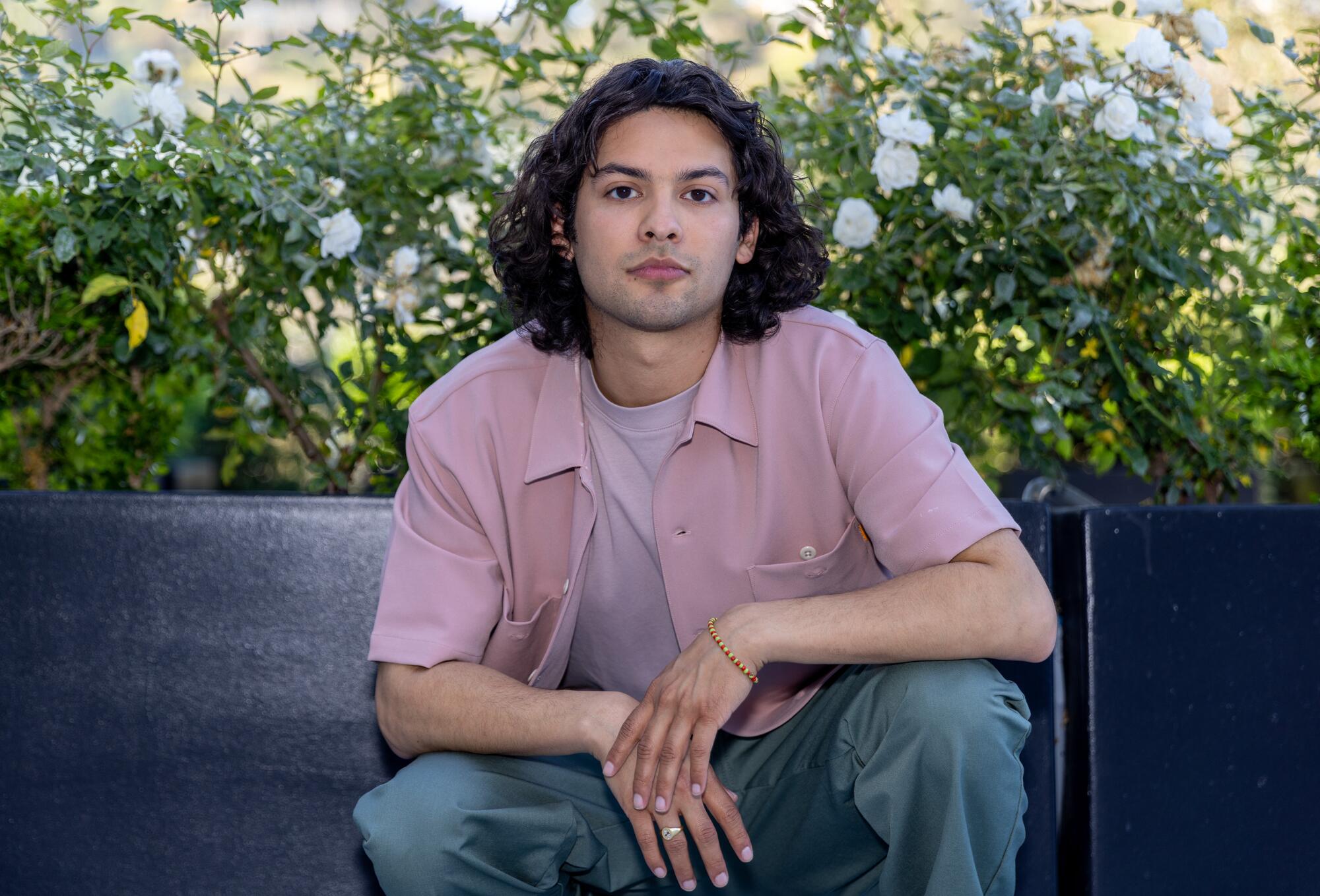
“They were honest in their lack of knowledge in [Miguel’s] culture,” he said, making sure to point out that this unfamiliarity with Latinos is an industrywide issue.
“You throw a rock in [Los Angeles] and 1 in 2 people are Latino” said Maridueña, who grew up in El Sereno. “Hollywood needs to catch up in that regard because if you throw a rock on set, 1 in 2people are definitely not Latino.”
He also credits the writers for not making Miguel one-dimensional.
“[It’s important] to have these roles where people are allowed to just be in their character and the first bullet point is not their ethnicity,” Maridueña said. “As we have more of these diverse roles, people will start to get used to [seeing us].”
Despite his age, the actor is a veteran at portraying nuanced characters that happen to be Latino. Prior to “Cobra Kai,” he gave life to Victor Graham in the popular NBC drama “Parenthood.” He also spent years refining his craft at Casa 0101, the Boyle Heights theater company founded by “Real Women Have Curves” playwright Josefina López.
“He approached the work with a lot of humility. There wasn’t any pompousness about him,” said Edward Padilla, former lead youth educator at Casa 0101 and a family friend. “He really came in there with dedication and willingness to be molded into the role that he was working on.”
Padilla credits part of Maridueña’s love of acting to the “Cobra Kai” star’s family members who are involved in community art activism. Maridueña’s younger sister Oshún Ramirez was a voice actor on Disney’s “Future-Worm!,” his mother, Carmelita Ramirez-Sanchez, leads the Boyle Heights Arts Conservatory, and his father, Omar G. Ramirez, is a Chicano artist.
“The family wanted him to start expanding beyond the types of things that he had already done,” Padilla said.
Maridueña’s face lights up at the mention of Casa 0101, and even hints at the possibility of returning to the theater if given the opportunity to direct a play of his own now that “Cobra Kai” is wrapping up.
“I can’t help but feel like the community that I was fostered in, El Sereno, Los Angeles, my family, my friends, Casa 0101, everyone that helped raise me and made me feel so comfortable in my skin — I was allowed to be myself,” he said.
As Maridueña enters a new phase in his career, Padilla says he hopes that his former student doesn’t feel obligated to always take on the weight of representing his community on screen.
“I want him to choose projects that really lift his spirit, because that’s the only way that we’re all going to make an impact [is] if we continue to choose things that lift our own individual spirits,” Padilla said.
Besides, Maridueña has done more than enough to highlight the richness and complexity of Latino culture. The actor gave life to Jaime Reyes in last year’s “Blue Beetle,” the first live-action superhero movie with a Latino lead. And just as Jaime was chosen by the alien scarab that gave him super powers, Maridueña was handpicked for this groundbreaking role.
What makes ‘Blue Beetle’ feel so authentic to Latino audiences? Its emphasis on family, says De Los contributor Alex Zaragoza.
“I thought it was Xolo and it had to be Xolo,” said “Blue Beetle” director Angel Manuel Soto, who endearingly refers to his lead as “mijo” or “my son.” Soto said working with Maridueña was a “dream come true,” noting his charisma, talent, energy and lack of ego among the many qualities that make him a standout actor.
“He really went far and beyond to the extent of almost doing a lot of his own stunts and prepping for it even on the hardest days,” Soto said, crediting Maridueña’s martial arts experience in “Cobra Kai.”
Despite the historic nature of “Blue Beetle,” the film had the misfortune of being released in the middle of the Hollywood SAG-AFTRA strikes, which meant that Maridueña and his castmates couldn’t promote the movie.
Strike or not, Maridueña’s family, friends and community rallied behind the film’s release. The Boyle Heights Arts Conservatory, led by his mother, hosted free “Blue Beetle” showings in Alhambra, Montebello and Hollywood.
“This is our way of saying, ‘Look, we know you cannot be in front, but we want you to know that you have thousands behind you,’” Ramirez-Sanchez told The Times last year. “When one of us can’t be there, none of us are as strong as all of us.”
Maridueña could have easily been cynical about how the film’s release panned out. Instead, he chose to focus on what “Blue Beetle” managed to accomplish.
“I remember having conversations with Angel and him telling me that this is bigger than all of us,” he said. “I remember that hitting me so hard in the moment and really allowing that to be the tone for the movie while we’re shooting.”
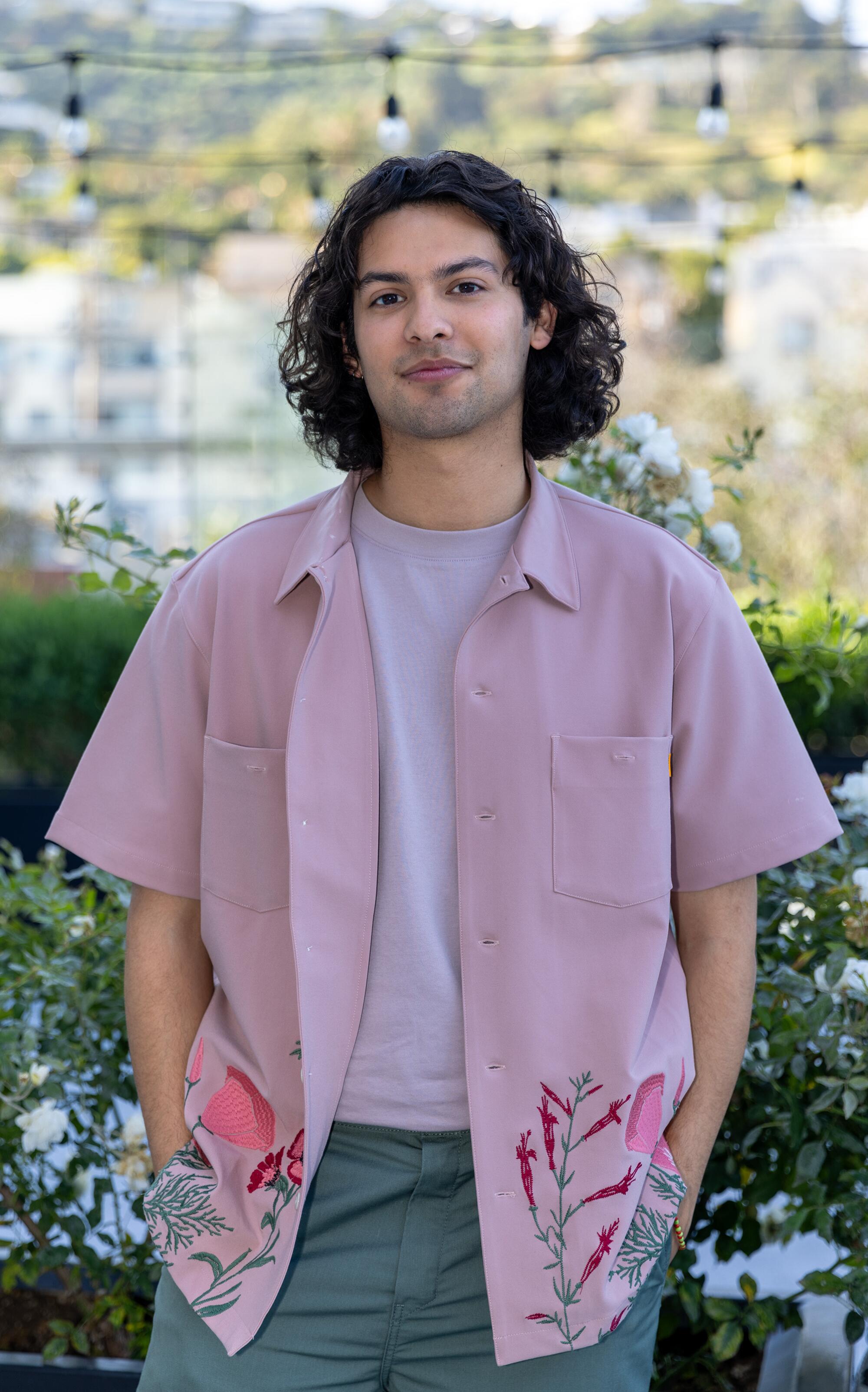
In talking about “Blue Beetle,” Maridueña remembers how his fear of looking bad on screen was immediately replaced by a sense of pride.
“As soon as I sat down in that chair for the first screen I was deathly terrified,” he said, re-spiraling in real time. “What if I’m bad? What if it’s terrible?
“But then we watched it and all of that love protrudes so heavily in the movie. I just couldn’t help but feel like, ‘Oh man, my family is going to feel proud because they are seeing themselves reflected.’ This movie is to show a whole new generation that they can have a superhero that looks like them.”
And though acting has claimed a huge part of his life, Maridueña still finds time to express himself off screen. He is an avid photographer who stands behind his Leica Q2 as he shoots his friends on their foodie outings. He’s also a self-proclaimed love doctor on his highly rated podcast “Lone Lobos,” which he co-hosts with fellow “Cobra Kai” actor and best friend Jacob Bertrand. He’s even dabbled in music, releasing a hip-hop track last October.
Maridueña also has several acting projects in the works. He’s slated to star alongside Al Pacino in the thriller “Killing Castro,” and will form part of the star-heavy cast of next year’s “The Smurfs Movie.”
“I feel very gracious for having worked with this impeccable [‘Cobra Kai’] cast and crew for seven years now. At the same time I feel [I’ve] grown from this part of my life,” he said.
“I’m ready to show what I’ve learned in other spaces now.”
More to Read
The Latinx experience chronicled
Get the Latinx Files newsletter for stories that capture the multitudes within our communities.
You may occasionally receive promotional content from the Los Angeles Times.
